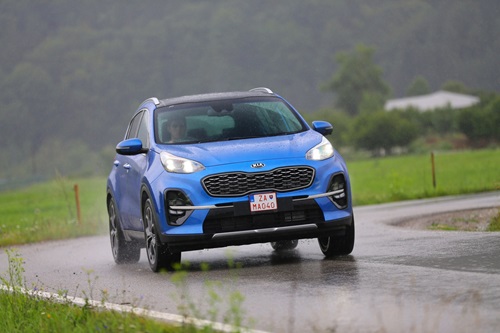The UK new car market has hit a million motors mark for the first time in five years, after new car registrations rose in June by a modest 1.1% to reach 179,263 units, according to the Society of Motor Manufacturers and Traders.
As a result, so far in 2024, 1,006,763 new cars have been registered, up 6.0% on the previous year but still down -20.7% on 2019.
June’s market growth was driven primarily by the fleet sector, where uptake rose by 14.2%, while private retail demand fell for the ninth consecutive month, down -15.3%.
Retail buyers accounted for fewer than four in 10 new cars registered (37.7%).
Wales was the only part of the UK to see registrations decline in June, with 6,091 new cars recorded, a 0.41% dip from 6,116 in the same month last year.
Electrified vehicle uptake continued to robustly grow in June, with plug-in hybrid (PHEV) volumes up 30.0% to reach a 9.3% market share, while hybrid electric vehicles (HEV) rose 27.2% to achieve 14.9% of the market.
Both powertrains also outpaced battery electric vehicle growth (BEV), which rose 7.4% but took its highest monthly share this year, accounting for 19.0% of all new vehicle registrations.
The UK’s zero emission transition – and the ability of manufacturers to meet the requirements of the Vehicle Emissions Trading Scheme – currently relies on the fleet sector as private consumer uptake continues to soften. Private BEV uptake has fallen -10.8% year to date, with fewer than one in five new BEVs going to private buyers. Overall, BEVs now comprise 16.6% of the new car market so far this year, slightly above the 16.1% achieved in the same period last year, with uptake behind the levels mandated by government.
The industry called on the next government to provide greater support to the consumer on the journey to zero emission mobility. Re-instating fiscal incentives for the private consumer by way of a halving of VAT on BEVs for three years would re-energise the market, putting an additional 300,000 private BEVs – rather than petrol or diesel cars – on the road over the next three years, on top of current outlooks.
This would help ensure that in 2035, half of all cars in use would be zero emission, cutting road transport CO2 emissions by 175 million tonnes between now and then.
Vehicle Excise Duty plans should also be revised so zero emission vehicles (ZEVs) are classed as essential rather than ‘luxury’ vehicles, by amending the ‘expensive car’ supplement due to be applied from next April.
In addition, public charge point use could be made fairer by reducing VAT from 20% to 5%, in line with home charging – a move that would support ZEV uptake and send the right message to consumers.
Mike Hawes, SMMT Chief Executive, said, “The year’s midpoint sees the new car market in its best state since 2021 – but this belies the bigger challenge ahead.
“The private consumer market continues to shrink against a difficult economic backdrop, but with the right policies in place, the next government can re-energise the market and deliver a faster, fairer zero emission transition.
“All parties are agreed on the need to cut carbon and replacing older fossil fuel based technologies with new electrified powertrains is the essential step to achieving that goal.”
UK top ten in June
Kia Sportage
Nissan Juke
Tesla Model y
VW Golf
BMW 1 Series
Hyundai Tucson
Nissan Qashqai
Ford Puma
MG ZS
Tesla Model 3
The UK new light commercial vehicle market declined 4.5% to 33,066 units in June, ending a record-equalling 17 month growth run, according to the latest figures from the Society of Motor Manufacturers and Traders.
Despite the fall, the market has remained robust in the first half of the year – up by 4.5% with some 177,620 new vans, pickups and 4x4s registered in 2024, the best performance since 2021. By Robin Roberts Miles Better News Agency
